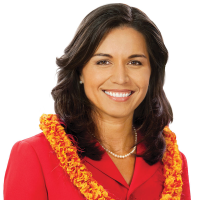First Hindu Elected to U.S. Congress
 Tulsi Gabbard
Tulsi Gabbard
The incoming 113th Congress will be the most religiously heterogeneous in history, reflecting the growing spiritual diversity of the American people. In January Congress will welcome its first Hindu member, Democrat Tulsi Gabbard of Hawaii’s Second Congressional District. Gabbard, a 31-year-old Iraq war veteran, defeated Republican Kawika Crowley in a landslide, 168,466 to 40,697 (81% to 19%).
Born in American Samoa, Gabbard previously served in the Hawaii House of Representatives and on the Honolulu City Council.
When she is sworn in January 3, Gabbard will succeed Democrat Mazie Hirono, a Buddhist who won a decisive victory (266,435 to 159,002 / 62.6% to 37.4%) over Republican Linda Lingle to replace retiring Democratic Senator Daniel Akaka. Hirono will be the Senate’s first Buddhist, just as, along with Democrat Hank Johnson of Georgia, she was the House of Representatives’ first Buddhist in 2006.
This spiritual variety is just what the nation’s founders intended when they inserted emphatic language into the Constitution guaranteeing that “no religious test shall ever be required as a qualification to any office or public trust under the United States,” language they would not have used had they meant to found the U.S. as a “Christian nation.”
Members of religious minorities began serving in Congress in 1845, when Lewis Charles Levin, the first Jewish member of Congress, arrived to represent Pennsylvania in the House. Only six years later, the first Mormon in Congress, John Milton Bernhisel, began representing the Utah Territory. California Democrat Dalip Singh Saund was the first and only Sikh to serve in Congress, starting in 1957. The first Muslim, Rep. Keith Ellison (D-Minnesota), was elected in 2006. Finally, in 2007 Rep. Pete Stark (D-California), who joined Congress in 1973, became the first Congressman to publicly declare that he does not believe in a Supreme Being. After winning re-election in 2008 and 2010, Stark lost his re-election bid in 2012 to fellow Democrat Eric Swalwell.
Aside from the first Hindu and Buddhist, the 113th Congress will be religiously similar to the 112th. The 299 Protestants will make up 56.4% of all members, followed by 161 Catholics (30.4%), 32 Jews (6%), 15 Mormons (2.8%) and 5 Eastern Orthodox (0.9%). Protestants comprise 48% of American adults, followed by Catholics at 22%, Mormons (2%), Jews (2%), Eastern Orthodox, Muslims & Buddhists (all at 1%) and others at less than 1%. The about 20% of Americans who either refuse to state an affiliation or are atheists/agnostics are the most underrepresented group.
-Matt Bewig
To Learn More:
Faith on the Hill: The Religious Composition of the 113th Congress (Pew Forum on Religion and Public Life)
Tulsi Gabbard (Wikipedia)
- Top Stories
- Unusual News
- Where is the Money Going?
- Controversies
- U.S. and the World
- Appointments and Resignations
- Latest News
- Trump Offers to Return Alaska to Russia
- Musk and Trump Fire Members of Congress
- Trump Calls for Violent Street Demonstrations Against Himself
- Trump Changes Name of Republican Party
- The 2024 Election By the Numbers






Comments